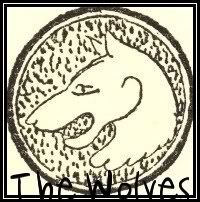 by Anzia Yezierska
by Anzia Yezierska
The first book on The Wolves reading list for 2011 proved difficult for me to approach. It reminded me too strongly of books I read as a kid growing up in a somewhat conservative Christian home – moralistic books about the extremes of religion. For example, I was disturbed by tales of Amish children being shunned by their entire communities for longing for things of the world, and not too impressed when they repented and returned to their families. Books about courtship, where the father had to approve the husband, stories about submissive wives quietly resigning themselves to men of powerful (and godly) will. Books of that sort, written simply and lacking characters who seemed real to me. Written to prove something. I shrunk from their version of the world, and I snuck things like Tamera Pierce’s The Song of the Lioness quartet under my covers, to prove to myself that there were other versions (perhaps equally odd, but at least Alanna could kick some serious butt!)
While I am not as religious as I used to be, I am still perplexed and absolutely infuriated by the attitudes and beliefs shown in Bread Givers. Here we find Orthodox Judaism and a Talmudic scholar who spends all his time reading the Torah and praying. Back in Poland he was supported by his community and the little bit of money his wife got out of her father’s business. Having moved to America, he finds New York’s Lower East Side less than willing to support his lifestyle and therefore fully expects his wife and daughters to pick up the slack. And they do, because he tells them that it says in the Torah “What’s a woman without a man? Less than nothing–a blotted-out existence. No life on earth and no hope of Heaven.” Only through service to husbands and fathers can a woman hope to reach heaven. What?!!
The existence that this 1920s immigrant family endures is miserable. The daughters work all day to put a meager bit of food on the table, the best of which goes to their father who has been comfortably reading and praying all day. Instead of lovingly passing on the bits of wisdom he’s picked up in this studies, Reb Smolinsky complains and reminds the girls of how wretched they are and smothers any chances at happiness that comes their way. The narrator of the tale is Sara, the youngest. She watches her father marry her three elder sisters off to men who make them utterly miserable, and she vows never to let him do the same to her.
‘More and more I began to think inside myself, I don’t want to sell herring for the rest of my days. I want to learn something. I want to do something. I want some day to make myself for a person and come among people.‘ (p. 66)
Sara escapes at 17, moving into a rented room and going to work in a laundry. She goes to night school, sacrificing everything – her looks, any chance of making friends or meeting a lover, even visits to her mother – in order to study and eventually go to college. There she desperately hopes to meet like-minded people, and become that ‘person‘ she believes she can be.
Episodic, leaping through time and leaving out details (like how did she actually manage to go to college?), the story has moments of brilliant detail, and an odd writing style that stems from the author speaking Yiddish first and English second. The complex relationship between Sara and her father is the book’s strength, and in spite of how awful he is, as Sara comes to understand him better a degree of sympathy for him is drummed up.
Overall I wouldn’t say that Bread Givers appealed to me. I wouldn’t have minded if the story was filled out somewhat, or if it was slightly less obvious. For all her determination and spunk, Sara seemed a bit flat, and while her father was lively, the rest of the characters suffered. It all felt a bit threadbare to me. Still, there were interesting topics and settings, briefly visited, that made the book interesting. The details about the author that are found in the introduction are quite compelling. Yezierska sounds like quite the person. I almost feel inclined to read more about her.
See E.L. Fay’s excellent review for another opinion. Thanks is due to her for picking this one out for us. Join The Wolves next month for Rosalind Belben’s Our Horses in Egypt.




Oh no, I hope this book wasn’t too triggering for you. I don’t know if you’re doing the Cairo trilogy read-along, but that also features an over-the-top tyrannical, misogynist father, only Muslim. Interesting how some things are just universal.
Although I liked the book overall, you’re right to point out how spotty it was in places. How did she get into college? How could she afford it, especially when she took out that apartment that was too much for her, just to be near that one guy? I would’ve also like to have seen more description and more sense of time and place.
By: EL Fay on January 31, 2011
at 6:16 pm
No worries – I just had a few of those sudden memories of things I hadn’t thought about in a long time. 🙂 And yes, I am doing The Cairo Trilogy – there’s an excess of tyrannical fathers in my life at the moment!
Both Sara’s infatuation with her sister’s poet lover, and then the philosophy teacher were weird episodes…
By: tuulenhaiven on January 31, 2011
at 10:25 pm
I agree about Reb Smolinsky – his sheer selfishness was genuinely horrifying at times, and his sheer GALL at blaming his own mistakes on other people! I agree with your criticisms of the novel’s simplicity and occasional patchiness, but it’s ended up being an interesting conversation at least – as usual! 🙂
By: Emily on January 31, 2011
at 6:29 pm
Someone said somewhere how amazing Reb Smolinsky’s skill at turning every situation against someone else was. Quite the talent there. And the more I think about it, the more the ending of the book impressed me – nothing simple about that.
By: tuulenhaiven on January 31, 2011
at 10:27 pm
The tyranny of the father was awful, what’s worse is that the novel was based on the author’s own experiences… And Sara’s concept of becoming a person is particularly meaningful, since it implies she wasn’t a person before while living under her father’s rules.
By: Shannyn (Libellule) on February 2, 2011
at 1:04 pm
What’s interesting is that apparently Yezierska’s father wasn’t nearly as tyrannical as the version that appeared in her book. According to the intro in the copy I read, he was very traditional, but not nearly as bad as Reb Smolinsky.
Sara’s desire to become a ‘person’ was definitely one of the more compelling aspects of the book.
By: tuulenhaiven on February 2, 2011
at 1:25 pm